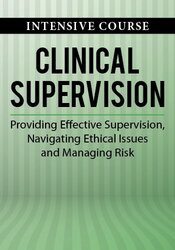
×

Tags: APA
This two-day course was developed for experienced, post-graduate, licensed clinicians who are interested in or have been providing clinical supervision. It is an intermediate-level course designed to introduce practitioners to best practices for providing clinical supervision. The presentation reviews models of clinical supervision and discusses the advantages and disadvantages of each model, details building blocks for the provision of competent supervision, discusses individual versus group supervision, suggests various observation models to enhance feedback, and demonstrates constructive feedback strategies.
As supervision is often a multicultural experience, potential supervisors are taught to identify personal values, biases, and expectations and utilize skills, techniques, and strategies for supervising diverse populations. Every discipline recognizes the importance of clinical supervision in training new practitioners and has established specific guidelines related to supervision. This course reviews the major ethical issues involved in supervision, discusses key legal issues associated with supervision, and provides specific risk management strategies to address these ethical and legal issues
This experiential, in-depth seminar details the supervisory process, answers your questions about ethical issues, risk, and liability, and prepares you to deliver competent clinical supervision.
All members of the PESI, Inc. planning committee have provided disclosures of financial relationships with ineligible organizations and any relevant non-financial relationships prior to planning content for this activity. None of the committee members had relevant financial relationships with ineligible companies or other potentially biasing relationships to disclose to learners. For speaker disclosures, please see the faculty biography.
Continuing education credit information is coming soon for this live webcast.

George B. Haarman, PsyD, LMFT, is a licensed clinical psychologist and a licensed marriage and family therapist with over 40 years of experience working in a variety of settings, including private practice, youth detention centers, juvenile group homes, child protective services, and juvenile probation. Dr. Haarman completed basic and advanced supervisor training required by the Kentucky Board of Psychology Examiners and maintains approval by the board to act as a supervisor. In his private practice, Dr. Haarman has provided clinical supervision to clinical and counseling practicum students as well as consultation about clinical supervision to psychologists for over 25 years. He is a national speaker on clinical supervision, depression, school refusal, ADHD, emotional disorders in children and adults and the DSM-5®. He is the author of three books: Clinical Supervision: Legal, Ethical, and Risk Management Issues, School Refusal: Children Who Can’t or Won’t Go to School, and Mastering DSM-5®. Dr. Haarman received his doctorate in clinical psychology from Spalding University in 1989. He has been an instructor at Jefferson Community College, Bellarmine University, and Spalding University.
Speaker Disclosures:
Financial: Dr. George Haarman maintains a private practice and is an adjunct professor Spalding University, Jefferson Community College, and Bellarmine University. He receives a speaking honorarium and recording royalties from PESI, Inc. He has no relevant financial relationships with ineligible organizations.
Non-financial: Dr. George Haarman is a member of the American Psychological Association and the Kentucky Psychological Association.
|
2 Day Intensive Course: Clinical Supervision: Providing Effective Supervision, Navigating Ethical Issues and Managing Risk
Mon, Jan 13, 2025 - 09:00am to Tue, Jan 14, 2025 - 05:00pm EST - Product Code LWC054425 |
|
2 Day Intensive Course: Clinical Supervision: Providing Effective Supervision, Navigating Ethical Issues and Managing Risk
Mon, Apr 07, 2025 - 10:00am to Tue, Apr 08, 2025 - 06:00pm EDT - Product Code LWC054425 |
For live CE credit, you must watch the live webcast in its entirety at its scheduled time and complete the CE quiz and evaluation within one week. You will have access for 90 days after the program for review.
Please note: Each day there will be a 70-minute lunch and two 15-minute breaks; one in the morning and one in the afternoon. Lunch and break times will be announced by the speaker and at their discretion. A more detailed schedule is available upon request.
Visit our FAQ page at https://www.pesicanada.ca/faq or contact us at https://www.pesicanada.ca/contact-us.
| 5 |
|
| 4 |
|
| 3 |
|
| 2 |
|
| 1 |
|
Satisfaction Guarantee
Your satisfaction is our goal and our guarantee. Concerns should be addressed to info@pesicanada.com.
Please wait ...